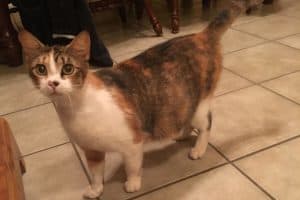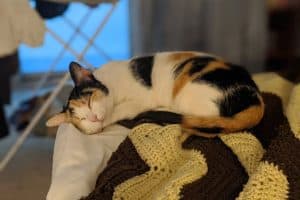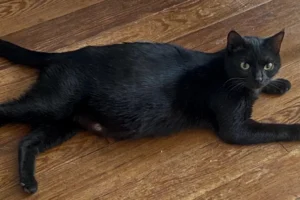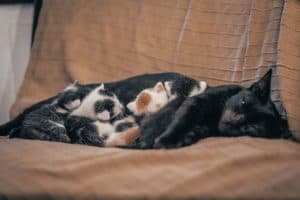Cats are known for their short pregnancy period, lasting only 9 weeks. But have you ever wondered why this is the case? Let’s find out.
Evolutionary Explanation
Cats have evolved to have a short gestation period of 9 weeks for a variety of reasons. One key factor is their natural instinct as predators. Quick pregnancies allow cats to reproduce rapidly, ensuring the survival of their species. Additionally, shorter pregnancies reduce the amount of time a mother cat needs to dedicate to carrying offspring, allowing her to focus on hunting and other essential activities. This efficiency in reproduction has been favored by natural selection, leading to the evolution of a shorter gestation period in cats compared to many other animals.
Physiological Factors
The biological reasons behind cats’ short 9-week pregnancy lie in their reproductive systems. Unlike humans, cats are induced ovulators, meaning they ovulate in response to mating. This immediate ovulation shortens the overall reproductive cycle. Additionally, cats have a unique uterine structure that allows for rapid embryo development. Their bodies are well-adapted to accommodate a short gestation period without compromising the health of the offspring. These physiological adaptations contribute to the efficiency of feline reproduction.
Additional Tip: Cats also have a higher metabolic rate compared to many other mammals, which may contribute to the need for a shorter gestation period. Their bodies prioritize energy expenditure for hunting and survival, making a quick pregnancy essential for maintaining their overall fitness in the wild.
Nutritional Needs
Cats have relatively short pregnancies compared to many other animals, lasting around 9 weeks. This brief gestation period means that pregnant cats have increased nutritional requirements to support the growth of healthy kittens. To ensure your pregnant cat receives adequate nutrients, consider feeding her a high-quality kitten-specific diet that is rich in essential nutrients like protein, calcium, and fatty acids. Additionally, provide plenty of fresh water and consult with your veterinarian to determine if any supplements are needed to support your cat’s health during pregnancy. Remember, meeting your cat’s nutritional needs is crucial for the health and development of her kittens.
Birth and Development
Cats have evolved to have short pregnancies to enhance their survival in the wild. The birthing process for cats is relatively quick and can last up to 12 hours. Kittens are typically born one after the other, with the mother licking them to stimulate their breathing and clean them. Due to the short gestation period, kittens are born smaller and less developed compared to animals with longer pregnancies. Despite this, kittens grow rapidly and reach maturity at around 6 to 12 months of age. Ensuring the mother cat has a safe and comfortable environment to give birth is vital for the health and well-being of both the mother and her kittens. Remember to provide warmth and privacy for the new family and consult with your vet for any additional care tips.
Key Tip:
– Monitor the mother cat closely for any signs of complications during labor, such as prolonged straining or problems delivering kittens. If you notice any concerning symptoms, contact your veterinarian immediately for assistance.
Environmental Adaptations
Cats’ short pregnancy period of 9 weeks is a result of their evolutionary adaptations to survive in the wild. In their natural habitats, cats face numerous threats like predators and limited resources. A shorter pregnancy period allows cats to reproduce quickly and maintain a healthy population despite these challenges. This trait enables them to adapt to changing environmental conditions swiftly. Additionally, a shorter pregnancy period reduces the time a pregnant cat is vulnerable to predators, increasing the chances of her offspring’s survival.
Hormonal Changes
During pregnancy, hormonal changes play a crucial role in cat gestation period. The hormone progesterone controls the length of pregnancy in cats. As progesterone levels decrease towards the end of the pregnancy, this triggers the onset of labor. Unlike humans who have a more extended gestation period due to different hormonal patterns, cats have evolved to have a shorter pregnancy period, which aligns with their reproductive needs in the wild. This hormonal control allows cats to give birth efficiently and promptly, ensuring the survival of their offspring.
- Cats have a unique physiological response to pregnancy, influenced by hormonal fluctuations that regulate the length of gestation.
- Progesterone levels decline, signaling the start of the birthing process and contributing to the efficient reproductive cycle of cats.
- Understanding these hormonal mechanisms sheds light on why cats have such a relatively brief pregnancy period.
Care During Pregnancy
During your cat’s brief 9-week pregnancy, it’s crucial to provide proper care to ensure a healthy outcome. Ensure your feline friend has a nutritious diet rich in protein and essential nutrients tailored for pregnant cats. Offer frequent, smaller meals to prevent overeating and ensure proper digestion. Keep her stress-free by providing a quiet, comfortable environment. Regular veterinary check-ups are essential to monitor her health and the progress of the pregnancy. Avoid using flea treatments and other medications without consulting your vet. Provide a quiet, secluded spot for her to rest comfortably as she prepares to welcome her kittens.
Common Pregnancy Complications
While most cat pregnancies progress smoothly, it’s important to be aware of potential complications that may arise. Watch for signs of toxemia, such as loss of appetite, vomiting, or lethargy. Consult your vet immediately if you suspect toxemia, as it can be life-threatening. Other common complications include uterine infections or difficult or prolonged labor. Ensure your veterinarian is aware of any concerning symptoms. Maintain open communication with your vet throughout the pregnancy to address any issues promptly. Be prepared to assist your cat during labor if needed, but always consult a professional in case of complications.
- Additional unique insight: Providing proper prenatal care can help reduce the risk of complications and ensure a smooth pregnancy for your feline companion.
Interesting Facts
Did you know that female cats can actually become pregnant by multiple males during the same heat cycle? This phenomenon is known as superfecundation and can result in a litter of kittens with different fathers. Talk about a unique family dynamic!
Another intriguing fact about cat reproduction is that a female cat in heat can mate with multiple males in a short period of time, making it difficult to determine the exact paternity of each kitten. This adaptation likely evolved to increase the chances of successful fertilization and ensure the survival of the litter.
Furthermore, cats have a unique reproductive system that allows them to conceive quickly and give birth after a relatively short gestation period of around 9 weeks. This efficiency in reproduction is essential for survival in the wild, where mothers need to care for their vulnerable kittens while protecting them from predators.
By understanding these fascinating aspects of feline reproduction, we can appreciate why cats are only pregnant for 9 weeks and marvel at the intricacies of nature’s design.
Reasons for Short Gestation Period
Cats have a relatively short gestation period of around nine weeks due to their efficient reproductive system. This quick turnaround allows them to produce multiple litters in a year, which is advantageous in the wild where survival is unpredictable.
The short pregnancy duration in cats is also a balance between energy conservation for the mother and ensuring the kittens are developed enough to survive outside the womb. This evolutionary adaptation helps cat populations thrive in their environments.
Another factor contributing to the brief pregnancy duration is the small size of the feline fetus. Cats typically give birth to small litters of kittens, and the relatively short time in the womb is sufficient for their development before birth.
Cats are also known for their rapid growth and maturation after birth, which compensates for the shorter gestation period. This swift development allows kittens to become independent and start hunting at an early age.
Understanding these reasons for why cats are only pregnant for 9 weeks sheds light on the remarkable adaptability of these feline creatures in ensuring the survival of their species.
Alex, a passionate animal lover, has experience in training and understanding animal behavior. As a proud pet parent to two dogs and three cats, he founded AnimalReport.net to share insights from animal experts and expand his knowledge of the animal kingdom.




